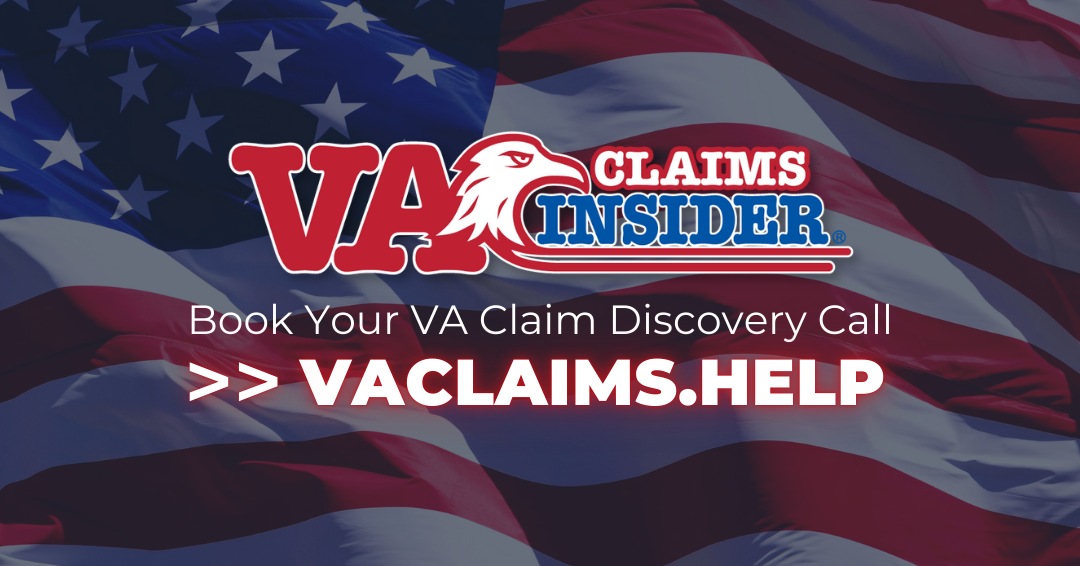Looking for Expert-Level VA Claim Answers?📱Call Us Now! 737-295-2226
Navigating the VA disability appeals process after a claim denial can feel overwhelming.
But don’t lose hope fellow veterans!
You have options, and understanding the best one for your situation might just lead to an approval.
In this expert-level guide from Brian Reese the VA Claims Insider, you’ll learn how to determine whether a Higher-Level Review or a Supplemental Claim is the best next step after a VA disability denial.
We’ll reveal and explain each option, walk through the decision-making process, and provide real-life examples so you can move forward with confidence.
Let’s begin!
Table of Contents
Summary of Key Points
- Veterans have three primary appeal options after a VA disability claim denial: Higher-Level Review (HLR), Supplemental Claim, or Board Appeal. This blog focuses on the first two as the most commonly used.
- A Higher-Level Review is ideal when the VA made a clear error or overlooked evidence already submitted. No new evidence is allowed, but you can request an informal conference with a senior reviewer.
- A Supplemental Claim should be used when you have new and relevant evidence not previously considered, such as private medical records, Nexus Letters, DBQs, or lay statements that weren’t part of your original claim submission.
- Veterans can continue submitting Supplemental Claims as long as they provide new and relevant evidence, and may also request a Higher-Level Review of a denied Supplemental Claim.
Three Paths to Consider After a VA Disability Denial
When you receive a denial or an underrated decision from the VA, you can pursue one of three appeal options:
- Higher-Level Review (HLR)
- Supplemental Claim
- Board Appeal
This article focuses on the two most commonly used options: Higher-Level Review and Supplemental Claim.
#1. Higher-Level Review (HLR)
Best For: When you believe the VA made a mistake based on the evidence already in your file.
This is not a good option if you have new and relevant evidence you want to submit to the VA.
A HLR is a review of the same evidence initially submitted with your claim by a more experienced VA claims adjudicator.
When to File a Higher-Level Review:
- The VA ignored favorable evidence already in your file
- The decision was clearly based on a misinterpretation of the law or policy
- You’re not submitting any new evidence
HLR Process:
- Submit VA Form 20-0996 within one year of your decision letter; you can also file a HLR online at VA.gov.
- A more senior VA reviewer conducts a de novo (brand new) review of your claim.
- You can request a one-time informal conference to present your argument directly to the reviewer
Example:
Jason, a Navy veteran, filed for VA disability benefits for migraines and was denied because the VA claimed there was no medical diagnosis.
But his initial claim packet included a private DBQ confirming his diagnosis of migraines and documenting severe symptoms that negatively impact his work, life, and social functioning.
He submitted a Higher-Level Review and requested an informal conference.
The reviewer acknowledged the oversight and granted Jason a 50% rating.
How Long Does a Higher-Level Review (HLR) Take?
The current timeline for VA Higher Level Review decisions is approximately 6-8 months from beginning to end.
Although the VA has set a target of 4-5 months for the HLR process, this goal does not reflect current reality.
Keep in mind that your HLR could be faster or slower depending on the unique circumstances of your case.
#2. Supplemental Claim
Best For: When you have new and relevant evidence that was not part of the original claim decision.
What Counts as New and Relevant Evidence for a Supplemental Claim?
New Medical Evidence
Medical evidence is mission critical for your Supplemental Claim, especially when it comes to proving the existence, severity, and connection of your disability to your military service.
Some common examples of medical evidence include:
- Private Medical Records: These can be medical notes, diagnosis reports, or treatment plans from civilian doctors or specialists who have treated your condition post-service.
- VA Medical Records: These are health records from any treatment you’ve received from a VA hospital or clinic.
- Nexus Letters: A Nexus letter is a statement written by a doctor that provides a medical opinion linking your current condition to your military service.
- Disability Benefits Questionnaires (DBQs): DBQs are standardized forms that allow veterans or their doctors to provide the VA with vital medical information regarding the severity and impact of their disabilities.
New Lay Evidence
Lay evidence refers to non-expert testimony or statements from individuals who can provide valuable information about your disability and how it affects your daily life.
It is often used to supplement gaps in medical records or when official documentation is lacking.
Examples of lay evidence include:
- Personal Statements: You can submit your own written account describing your symptoms, when they began, how they have progressed, and how they affect your ability to function.
- Buddy Statements: Fellow service members who witnessed your in-service injury or can attest to events during your military service can provide written statements to support your claim.
- Family and Friends Statements: People close to you who have observed the impact of your disability on your life can provide statements.
Supplemental Claim Process:
- Submit VA Form 20-0995 within one year of your decision to preserve the effective date; you can also file online at VA.gov.
- Attach the new and relevant evidence to your claim.
- The VA still has a duty to assist and may help gather additional records if needed.
Example:
Angela, an Army veteran, was denied PTSD due to a lack of in-service stressor evidence.
After her denial, she began therapy with a private psychologist who documented her symptoms and linked them to a traumatic deployment event.
She also secured a strong Nexus Letter.
Angela submitted a Supplemental Claim with the new evidence and was granted service connection for PTSD.
How Long Does a Supplemental Claim Take for a Decision?
As of April 2025, the average time to process a Supplemental Claim for disability compensation or pension benefits is approximately 131.0 days.
The VA’s stated goal is to complete most Supplemental Claims within 125 days.
Keep in mind that timelines can vary depending on the complexity of your claim, the type of evidence submitted, and the VA’s current workload.
Submitting strong, well-documented evidence with your claim can help reduce delays and improve your chances of approval.
Expert-Level VA Claims Insider Tip
Did you know you can request a Higher-Level Review of a denied Supplemental Claim?
It’s true.
For example, let’s say you filed an initial HLR and were denied.
Then you submitted a Supplemental Claim with new and relevant evidence, and you were denied again.
You can file a Higher-Level Review of the denied Supplemental Claim.
Here’s another Insider Tip: You can continue submitting Supplemental Claims as long as you have new and relevant evidence that was not previously considered by the VA.
And if those get denied, you can HLR the denied Supplemental Claim.
How to Choose Your Best Appeal Option
Did the VA make an obvious error in evaluating your claim using existing evidence?
- Yes: File a Higher-Level Review.
- No: Move to the next question.
Do you have new and relevant evidence not previously submitted?
- Yes: File a Supplemental Claim.
- No: HLR may still be an option, or consider a Board Appeal.
Do you want a Veterans Law Judge to hear your case?
- Yes: Consider a Board Appeal (note: it can take 1–3 years).
Key Considerations Before You File an Appeal
- Timeliness: All appeal options must be initiated within one year from the date of the VA’s decision letter. Any previously denied claim past one year must be done as a Supplemental Claim.
- Representation: Consider seeking assistance from a VA-accredited attorney or representative to navigate the appeals process effectively.
- Documentation: Ensure all forms are filled out accurately and all necessary evidence is included to support your appeal.
Conclusion & Wrap-Up
A VA claim denial is not the end of the road—it’s a detour.
The key is knowing which path to take next.
If the VA got it wrong, a Higher-Level Review may get your claim back on track without waiting years.
If you’re missing crucial medical evidence, a Supplemental Claim gives you a chance to strengthen your case.
Both are powerful tools when used correctly.
Know your options.
Gather your medical evidence.
And never stop fighting for the benefits you earned through your service to our country!
Remember: YOU SERVED! YOU DESERVE!
These benefits are not a handout; you’ve earned them through your honorable service.
At VA Claims Insider, we’re here to help you maximize your benefits and secure the compensation you rightfully deserve.
We’ve helped 25,000+ veterans increase their VA rating—YOU could be next!
Let’s get you the VA disability benefits you deserve.
If you need expert help navigating the VA claims process, our team of VA claim coaches is ready to educate and empower you to victory!
✅ If you’re sick and tired of waiting and want expert guidance to get the VA rating and compensation you deserve faster, CALL US RIGHT NOW at 737-295-2226 for a no-obligation VA claim consultation!
Want Expert-Level Help With Your VA Claim? WE GOT YOUR SIX!
How does VA Claims Insider help veterans?
We make the confusing and frustrating VA claim process EASY through our 8-step proprietary system and one-on-one coaching; we’re the VA Claim EXPERTS you can trust, and YOU are never alone in this fight against the VA!
You’ll also receive VA disability expert Brian Reese’s SEM Method Blueprint—a proven formula that has helped over 25,000 veterans win their VA disability claims faster:
Strategy + Education + Medical Evidence = VA Rating and Compensation You Deserve FASTER!
Start today and unlock an exceptional level of service you deserve for serving our country:
➡️ You’ll hear from a VA Claim Expert over email within 15 minutes of signing up today.
➡️ You’ll hear from your Veteran Coach team within 24 hours of all inquiries during normal business days/hours.
➡️ Our terms are simple: IF WE DON’T WIN, YOU DON’T PAY. You have nothing to lose and everything to gain!
Click the red button below to start the process of winning your VA claim right now:
Fellow Veterans: Are You Ready to WIN, SERVICE-CONNECT, and INCREASE Your VA Disability Rating FASTER? We Can Help!

- VA Claims Insider is the #1 most trusted name in VA disability claims.
- Work directly with a VA claims coach who can help lead you to VA claim victory.
- 25,000+ disabled veterans served in our membership programs since 2016.
- 30% average rating increase for veterans who complete our #1 rated Elite program.
- 4.7/5.0 average rating out of 5,500+ total reviews; over 4,500 5-star reviews.
About the Author

Brian Reese
Brian Reese is a world-renowned VA disability benefits expert and the #1 bestselling author of VA Claim Secrets and You Deserve It. Motivated by his own frustration with the VA claim process, Brian founded VA Claims Insider to help disabled veterans secure their VA disability compensation faster, regardless of their past struggles with the VA. Since 2013, he has positively impacted the lives of over 10 million military, veterans, and their families.
A former active-duty Air Force officer, Brian has extensive experience leading diverse teams in challenging international environments, including a combat tour in Afghanistan in 2011 supporting Operation ENDURING FREEDOM.
Brian is a Distinguished Graduate of Management from the United States Air Force Academy and earned his MBA from Oklahoma State University’s Spears School of Business, where he was a National Honor Scholar, ranking in the top 1% of his class.



